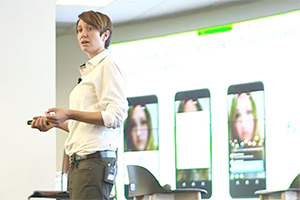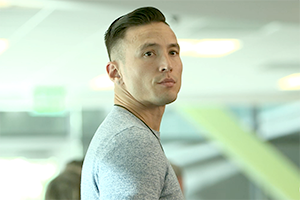Computer coder Charles Anderson has first-hand experience living with mental illness. As a young student, he took advanced classes and got good grades, but emotional and physical abuse at home lead to a breakdown. He eventually dropped out of high school, started taking drugs and was first incarcerated at 16-years-old.
“When I got incarcerated it surprised me that they didn’t treat me as a human any more,” he recalled. “I was just another number. Nobody ever asked why this child did these things or wanted to find out more about me.”
Anderson spent years in and out of jail and prison. During one incarceration, he entered a program where he learned computer coding. He continued his education after release and now works for a technology company.
Anderson was one of 300 participants at “Innovate for Impact: Improving Access to High Quality Mental Health Care,” a one-day summit and workshop at Verily Life Sciences in South San Francisco. The California Mental Health Services Oversight and Accountability Commission and multiple partners brought together mental health consumers, stakeholders and providers, county officials and private sector partners to explore ways to use innovation and technology to improve mental health care.
The Commission was created when California voters passed Proposition 63, the Mental Health Services Act (MHSA). The law provides approximately $100 million a year to counties for the exploration of new or adaptive approaches in community mental health, including the use of technology.
“California is well known as a state of innovation that has impacted and influenced the rest of the world,” said John Boyd, CEO of Mental Health Services for Sutter Health and chair of the state Commission.
The purpose of the Summit, Boyd said was to “leverage that reputation and those resources in a unique way, as well as the significant brain talent that exists here, and put it all to work to ensure that we provide mental health and addiction support for everybody in way that not only benefits California, but the United States and the rest of the world.”
While this was the first such event hosted by the Commission, Boyd said, there will be others in the future. The Commission also will be working with stakeholders to develop an “innovation hub” that helps counties develop and deploy tools and practices that improve mental health outcomes.
 Danielle Schlosser is the lead clinical scientist for the Mental Health Team at Verily Life Sciences, which hosted the event: “Some of the changes that I think we’ve seen are disrupting some of the assumptions. For instance, how do we learn about people’s mental health, how do we intervene?”
Danielle Schlosser is the lead clinical scientist for the Mental Health Team at Verily Life Sciences, which hosted the event: “Some of the changes that I think we’ve seen are disrupting some of the assumptions. For instance, how do we learn about people’s mental health, how do we intervene?”
Verily’s mission is to improve lives by making the world’s healthcare data useful. Schlosser, who was a keynote speaker, said: “We’re thinking how we can collect, organize, activate information and empower people to make better health decisions, to empower the providers to intervene more proactively. We’re working on a suite of approaches to be able to do that.”
Austin Heyworth, public affairs manager at Uber, described how his company can help provide better services, while saving clients money and reducing system costs.
“On the business side we’ve been interested in the non-emergency medical transportation field, which is obviously a big issue when controlling healthcare costs. One of the biggest issues is getting people to their appointments and if they’re in outpatient care getting them there on a consistent basis – that’s something that we think Uber can provide.”
Heyworth added that using Uber for these services can help get people to and from their appointments and provide centralized payment and a record of drop-offs and pick-ups. He also said there is the potential for job creation as the need for drivers, coders and other personnel could increase with the demand for new, innovative services.
“The beautiful thing about technology — I think we can bring these services that are usually hard to get,” said Anderson. “Everybody has a cell phone nowadays. Why not make an app where we could provide these services?”
 Anderson was thinking about the problem as a tech innovator and a client, and how to make the system work better for others:
Anderson was thinking about the problem as a tech innovator and a client, and how to make the system work better for others:
“When you’re going through this trauma, you don’t feel like going out. You don’t feel like talking to somebody. You feel like staying to yourself. If they don’t feel like talking to a person, they can text and if they feel more comfortable, they can call. Better yet, they can FaceTime, make it more personal.”
Besides creating new services and research tools, Commission Vice Chair Khatera Aslami-Tamplen pointed out the value of new media, especially social media: “The technology can help in our efforts to portray a fair image of people who struggle with mental health issues. Technology can help us give that image and not what we constantly see in the media, when it really portrays people in the most negative aspects.”
Sacramento Mayor Darrell Steinberg, who wrote and helped pass Proposition 63, had some sage advice for all those working in this new space, “When it comes to innovation, I think it is important that we be willing to delve deep into the research. But I also think sometimes it’s important that we step back and live by the mantra ‘keep it simple.’”
Anderson, the client and coder, echoed Steinberg from his perspective: “The biggest dreams of mine deal with helping people. I want to use my skills to not only build things for people, but to also give them these skills that I thought I can never do,” said Anderson who is grateful for the help he received during his struggles and now wants to pay it forward. “If we can provide these opportunities to them, it can change a lot of lives.”
Read our entire series on innovation in mental health services
Part 1: Tech Industry and Mental Health Advocates Seek Solutions at First-Ever Summit
Part 2: County and Tech Innovators Are Rethinking California’s Mental Health Services
Part 3: Can California’s Techies Move the Needle on Mental Health?

